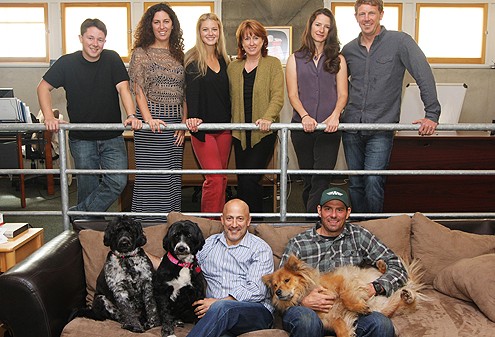Pawing at new ideas: Online advertising veterans want to move beyond the click
IN THIS ARTICLE
- Features Topic
- Stephen Nellis Author
By Stephen Nellis Friday, April 6th, 2012

The staff of Santa Barbara marketing company Underdog Media. Back row, from left: Justin Vizaro, Tara Stephenson, Lizzy Morrison, Barb Jennings, Lisa Williams and Mike Tarpey. Front row, from left: Underdog Media CEO Jeff Hirsch, left, and Founder Shayne Mihalka. (Sky Gilbar photo)
Deep in Santa Barbara’s Funk Zone, a group of online advertising veterans are working to move the industry beyond the click.
Underdog Media was founded in 2007 by Shayne Mihalka, an original member of the pre-IPO ValueClick. Late last year, it brought on Jeff Hirsch, another early member of both ValueClick and Fastclick and the former CEO of AudienceScience, the company that coined the phrase “behavioral targeting.”
Hirsch doesn’t have anything against clicks — in fact, they were a revolutionary way to measure the effectiveness of an ad 15 years ago. But given how low click-through rates usually are — between a fraction of a percent and a few percent — clicks can only measure so much, he said.
“It means only one out of 100 are going to engage with your ad. Attribution of how well your ad is working is still a problem that hasn’t been solved,” Hirsch said.
Luckily, there is another, more important metric that can be measured very well — return on investment, the holy grail of advertising campaign. It’s standard practice in the industry to test different channels – display ads, search ads, social media ads on sites like Facebook — to find out which is driving the most customers toward the advertiser’s product or service.
Hirsch said one of Underdog’s innovations is an ability to rapidly adapt to whether customers are engaging with an ad, with the goal of driving better returns.
“It really is back to the basics of, ‘Where is my ad working best?’ and very fast decision making about putting in more where it’s working,” Hirsch said.
Underdog’s technology is proprietary, but at its core is a blend of art and science that aims to make decisions about where to shift an ad campaign’s resources among various channels and version of the creative content. The idea is to blend the best of what computers do with the best of what the human brain does.
Computers, for example, are good at chomping through mountains of data and coming up with a definitive, 100-percent correct answer. The brain of a human expert is good at dealing with messy or incomplete data and making a very quick judgment that will be correct a good deal of the time.
Underdog’s technology platform has its team’s cumulative expertise baked in so that it can make decisions faster. You don’t need to waste money gathering every scrap of data, Hirsch said. Once you have the right data and you know it, you can make a move.
“You don’t have to have 100 percent of the information to make a decision — this isn’t brain surgery. You just need enough information to make a good decision.”
Another point of distinction for Underdog is what the company calls “polite retargeting.” The classic example of re-targeting are stalker shoes. A consumer checks out a pair of shoes on a site like Zappos.com, perhaps putting them in a shopping cart, but navigates away from the page before closing the sale. With re-targeting, a specialized ad featuring those very shoes could follow that consumer across the web for weeks on end.
Re-targeting works at driving sales, but it also creeps out consumers — and potentially damages the brand of the advertiser. Underdog solves the problem with ad re-targeting that’s more of a reminder than a stalker. “We’re going to show you the ad three to five times, and if you don’t respond, we’re done. We don’t want to creep people out,” Hirsch said.
With the potential for a “Do Not Track” list circulating within the federal government, the online ad industry has privacy high on its radar. Hirsch said the keys are transparency and education — making sure consumers know who’s serving them ads, and how they can opt out. He also pointed out that some of the largest players in the online advertising space are far smaller and less powerful than some of the huge corporations to whom consumers voluntarily hand over piles of data. For example, if you leave a Facebook or Gmail tab open while you’re going about your business in a browser, those companies are tracking nearly everything you do online. Small advertisers don’t go nearly that far.
“If you get too restrictive about privacy, companies like Google and Facebook are going to win. You’re de-democratizing the web,” Hirsch said. “Look closely at your agreement the next time you sign up for a credit card. It’s much worse than anything that goes on with online advertising.”











